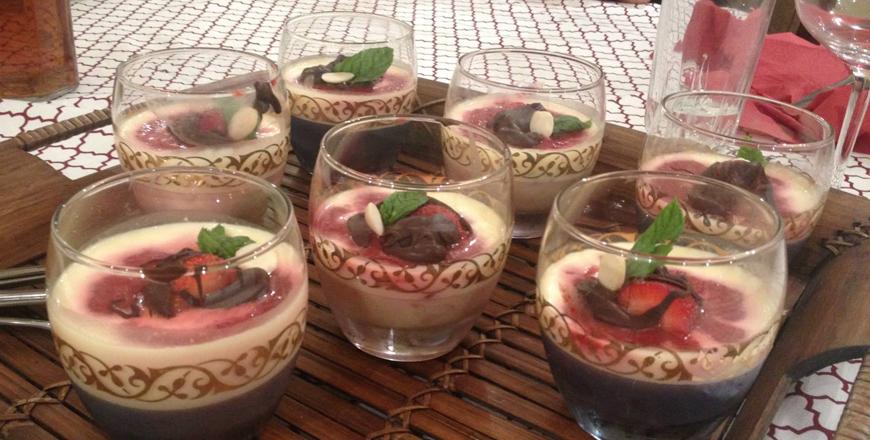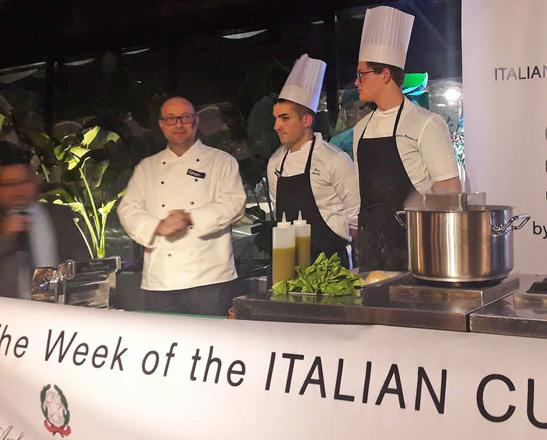You are here
Home restaurant in Amman offers taste of Italy and int’l conversation
By Giulia Maccagli - Jul 25,2015 - Last updated at Jul 28,2015

The iced fruit crumble served during an ‘international dinner’ hosted by an Italian couple in Amman recently within a ‘home restaurant’ initiative (Photo by Giulia Maccagli)
AMMAN — The last sprinkle of parmesan cheese falls on the hot lasagne, at the exact moment when the doorbell rings: The guests of tonight’s home restaurant have arrived.
This is the fifth home restaurant dinner that Marco and Laura, two Italians working in Amman have held, and they still find it thrilling to be cooking at home for people who don’t even know each other.
“Although we started the home restaurant as a personal challenge in order to earn some money, we soon realised that [it] was giving us much more; it allowed us to rediscover the pleasure of meeting new people, of having the chance to get to know Jordanian culture [more deeply], and create new international friendships,” says Marco, smiling.
“The home restaurant is not just about food, it’s also about people,” he adds.
“In a world where getting to know or simply talk to people is perceived as a precious achievement, [it] is an occasion to actually interact face-to-face with someone” in “a relaxed environment”, having a conversation, Marco says.
Quite widespread in Italy, home restaurants are self-organised businesses.
By dusting off grandmothers’ recipe books, home restaurants offer the possibility of tasting traditional homemade food in the owners’ home, thus also experiencing a country’s traditions.
The hot lasagne lands on the table, accompanied by the music of an Andrea Boccelli song.
Tonight, the home restaurant wears a particularly international dress: Jordan, Britain, the US, Mozambique, and Italy sit at the table.
The initial embarrassment of talking to new people melts at the first bite of lasagne and the atmosphere is warmed by chats and laughs.
“So, question to the expatriates: What do you think of Jordan?” asks Oraib Tahtamoni, a bank’s IT manager who has a passion for interior design.
“Well, it’s a wonderful country, all to discover,” replies Cecilia Pietrobono, an Italian working for the European Commission who tonight was looking for the “taste of home”.
But she acknowledged that some “cultural differences” are lost in translation.
“Yesterday, my taxi driver had a bite of the Italian culture when, waving his hand with his fingers close in front of my face, he encountered my angry reaction... I had no clue that to Arabs that gesture means ‘wait’, while in Italy it’s a rude way to say ‘What the hell do you want?’,” Pietrobono adds.
The guests burst in laughs and start showing different gestures typical of their countries of origin.
The conversation continues, jumping into several subjects, from politics, to the roles of women in different realities, to culinary traditions.
The atmosphere is soon sweetened by the arrival of dessert, an iced fruit crumble, with espresso as its inevitable companion.
“This reminds me of the time when I was a kid and relatives and neighbours used to spend time together, sharing food and knowledge,” says Marco.
Tahtamoni finds a common ground in that tradition.
“Actually, sharing is something also rooted in Arab culture as we are famous for our kindness and generosity. It’s natural that we share homes and meals,” she says.
For her, however, “the idea of the home restaurant was at first a bit edgy and strange, since not so many people would have the bravery to step ahead and try something unconventional.”
But, after her experience, Tahtamoni is happy to have had the chance to meet new people of different cultures and share visions and life matters, harking back to age-old traditions.
The dinner ends with the exchange of contacts and an invitation to learn how to cook the traditional Jordanian mansaf of rice, lamb, pine nuts and “jameed”— a yoghurt-based sauce.
Related Articles
AMMAN — The Italian embassy is offering Jordanians a taste of their traditional cookery at the 2nd edition of the World Week of Italian Cuis
AMMAN — Local gourmets on Wednesday had the chance to experience a taste of “la dolce vita” (the sweet life) in a live cooking and mus
AMMAN — Five local designers and an Italian fashion designer have collaborated to produce a combination of the modern and the traditional, i


















